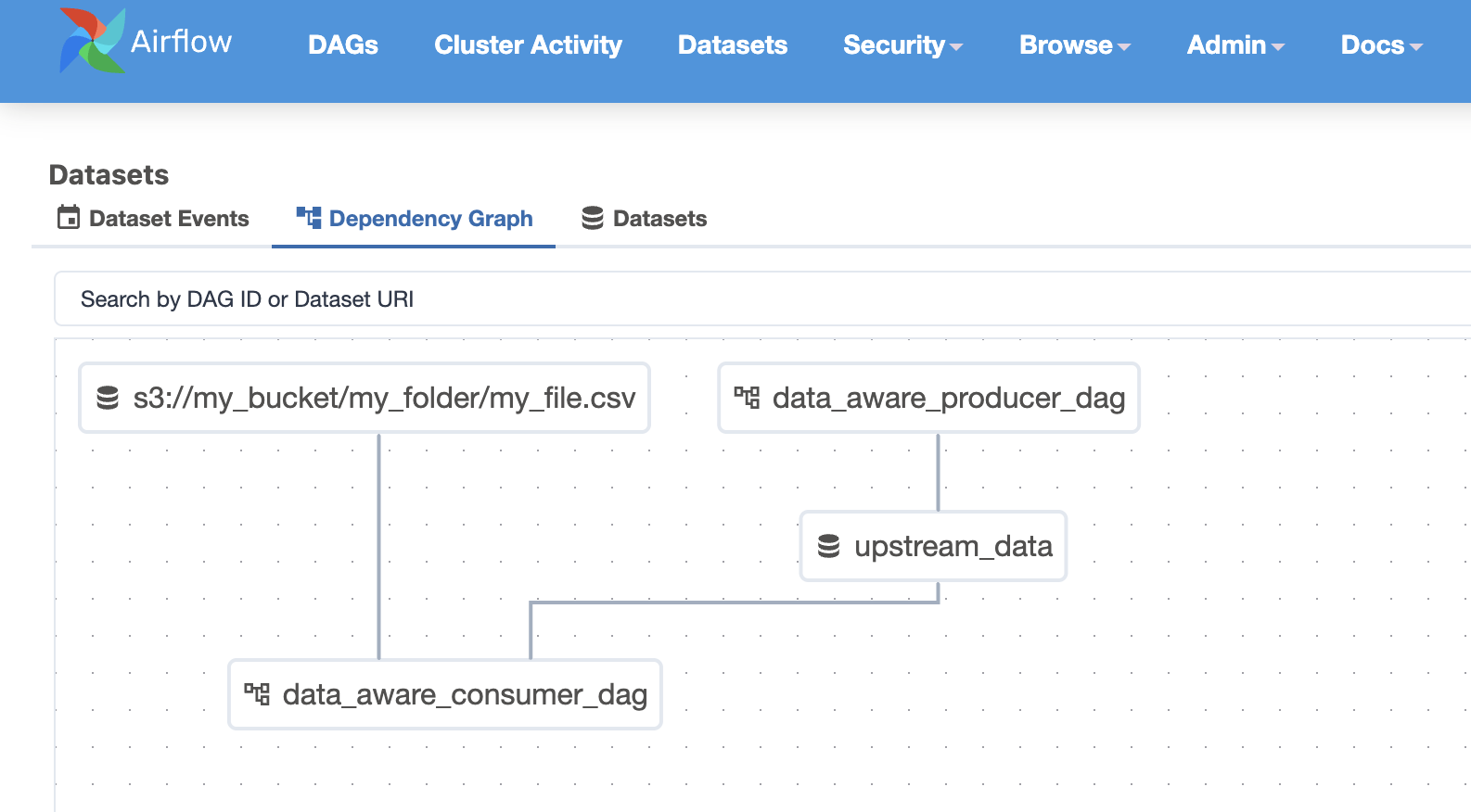How to Trigger a DAG using Datasets
Overview
This guide explains how to trigger Airflow DAGs with Datasets. DAGs can be triggered by another DAG using datasets or by an external process that sends a dataset event using the Airflow API.
Producer DAG
Airflow enables DAGs to be triggered dynamically based on dataset updates. A producer DAG updates a dataset, automatically triggering any consumer DAGs subscribed to it.
To implement this, start by creating a DAG and defining the dataset it will update.
# data_aware_producer_dag.py
import datetime
from airflow.decorators import dag, task
from airflow.datasets import Dataset
# A dataset can be anything, it will be a poiner in the Airflow db.
# If you need to access url like s3://my_bucket/my_file.txt then you can set
# it with the proper path for reuse.
DAG_UPDATED_DATASET = Dataset("upstream_data")
@dag(
default_args={
"start_date": datetime.datetime(2024, 1, 1, 0, 0),
"owner": "Noel Gomez",
"email": "gomezn@example.com",
"retries": 3
},
description="Sample Producer DAG",
schedule="0 0 1 */12 *",
tags=["extract_and_load"],
catchup=False,
)
def data_aware_producer_dag():
@task(outlets=[DAG_UPDATED_DATASET])
def extract_and_load_dlt():
print("I'm the producer")
extract_and_load_dlt()
dag = data_aware_producer_dag()
Thats it, now you are ready to create your Consumer DAG
Lambda Function
Alternatively, you can trigger a DAG externally using the Airflow API . In this example we will be using an AWS Lambda Function to trigger your DAG once data lands in an S3 Bucket.
Creating your zip files
To run your python script in a lambda function you need to upload the
requests
library
along with your
lambda_function.py
file.
- Create a python file locally and write out your function. Below is an example function.
Example Lambda function:
import requests
import os
import json
# In Lambda, environment variables are set in the Lambda configuration
# rather than using dotenv
API_URL = os.environ.get("AIRFLOW_API_URL")
API_KEY = os.environ.get("DATACOVES_API_KEY")
def update_dataset(dataset_name):
url = f"{API_URL}/datasets/events"
response = requests.post(
url=url,
headers={
"Authorization": f"Token {API_KEY}",
},
json={"dataset_uri": dataset_name,}
)
try:
return response.json()
except ValueError:
return response.text
def print_response(response):
if response:
msg = json.dumps(response, indent=2)
print(f"Event posted successfully:\n{'='*30}\n\n {msg}")
def lambda_handler(event, context):
print("Lambda execution started")
try:
print(f"Environment variables: API_URL={API_URL is not None}, API_KEY={API_KEY is not None}")
# Extract S3 information
bucket = event['Records'][0]['s3']['bucket']['name']
key = event['Records'][0]['s3']['object']['key']
print(f"S3 event details: bucket={bucket}, key={key}")
print(f"File uploaded: {bucket}/{key}")
# Airflow Dataset name must be static so if filename changes, that would have to
# be addressed above
dataset_name = f"s3://{bucket}/{key}"
response = update_dataset(dataset_name)
print_response(response)
return {
'statusCode': 200,
'body': 'Successfully processed S3 event'
}
except Exception as e:
print(f"ERROR: {str(e)}")
import traceback
print(traceback.format_exc())
return {
'statusCode': 500,
'body': f'Error: {str(e)}'
}
- Run the following commands locally to prepare a zip file with everything you need.
pip install --target ./package requests
cd package
zip -r ../deployment-package.zip .
cd ..
zip -g deployment-package.zip lambda_function.py
Create a Lambda Function
- Create a new AWS lambda function.
- Set the runtime to Python 3.10.
- Create an IAM role and add the following policy: - AmazonS3ReadOnlyAccess to bucket
-
Upload
deployment-package.zipfrom the earlier step into the Lambda function.
Set Environment Variables
-
Gather your
API credentials
Configure the following environment variables in the Lambda Function's Configuration:
- `AIRFLOW_API_URL` (the API URL for Airflow) - `AIRFLOW_API_KEY` (the API key for authentication)
Configuring the S3 Event Notification
- Go to S3 and Open the Target Bucket
-
Create a New Event Notification under the bucket's properties
-
Event Name:
TriggerAirflowDAG - Prefix (Optional): Specify a subfolder if needed.
- Suffix (Optional) If you would like to trigger specific files ie) .csv
-
Event Type:
Select
All object create events - Destination: Select AWS Lambda and choose the function created earlier.
-
Event Name:
Now you are ready to set up your Consumer DAG.
Setting Up the Airflow DAG
Whether you decide to use a producer DAG or the Airflow API, the last step is to create an Airflow DAG that is triggered by a dataset event rather than a schedule. This particular example can be triggered with either a
LAMBDA_UPDATED_DATASET
or
DAG_UPDATED_DATASET
.

Example DAG
import datetime
from airflow.decorators import dag, task
from airflow.datasets import Dataset
LAMBDA_UPDATED_DATASET = Dataset("s3://my_bucket/my_folder/my_file.csv")
DAG_UPDATED_DATASET = Dataset("upstream_data")
@dag(
default_args={
"start_date": datetime.datetime(2024, 1, 1, 0, 0),
"owner": "Noel Gomez",
"email": "gomezn@example.com",
"retries": 1
},
description="Sample Producer DAG",
schedule=(LAMBDA_UPDATED_DATASET | DAG_UPDATED_DATASET),
tags=["transform"],
catchup=False,
)
def data_aware_consumer_dag():
@task
def run_consumer():
print("I'm the consumer")
run_consumer()
dag = data_aware_consumer_dag()
Note
Ensure the Dataset you are sending an event to exists in Airflow. It will be created automatically when a DAG is created. If a dataset does not exist when the API event is sent, the API call will fail.